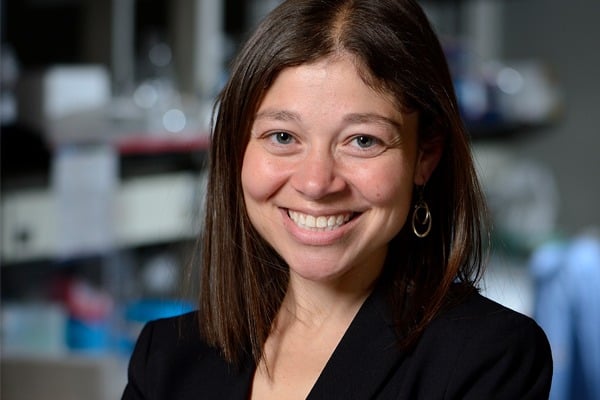Jamie Spangler joins BME faculty

Jamie Spangler, who earned her bachelor’s degree in biomedical engineering with a concentration in chemical and biomolecular engineering at Johns Hopkins in 2006, will serve as assistant professor with joint appointments in those departments beginning July 1, 2017.
Spangler, a native of the Chicago suburb of Northbrook, currently holds a postdoctoral fellowship in Chris Garcia’s lab in the Stanford University School of Medicine’s Department of Molecular and Cellular Physiology. In 2011, she earned a PhD in biological engineering at MIT under the supervision of Dane Wittrup.
Spangler specializes in applying structure-guided molecular engineering to develop innovative platforms for the discovery and design of protein therapeutics that recruit novel mechanisms to overcome the limitations of existing drugs. In particular, her work will focus on engineering antibody-based molecules that reshape the immune response for targeted therapy of cancer, infectious diseases, and autoimmune disorders.
Using x-ray crystallography to determine the structure of proteins, Spangler merges her background in the newer field of protein engineering and design with information drawn from the more established arena of structural biology to better engineer drugs for immunotherapy. The platforms she develops are proteins that take the place of existing proteins in the body, mimicking their functions but working in a much more targeted, directed way, allowing them to home in to specific cells and activate those most relevant to the disease being treated. “If we can build up and understand mechanisms on the molecular level, we can better design drugs and therapies for a particular disease indication,” Spangler says.
Those drugs will be designed to overcome the historical limitations of small-molecule drugs, which have a tendency to cross-react, creating challenges when trying to target specific protein receptors. Being larger, proteins—antibodies, for example—are better equipped to selectively bind, and thus change the behavior, of target proteins. “A protein has a larger interface and the sophistication to perform more complex functions,” Spangler says.
While most therapeutic proteins act by binding to a protein in the body and blocking its function, Spangler is developing proteins that act in different ways. With their two arms, antibodies provide opportunities for conjugation; while one arm is blocking signaling, the other can act through down-regulation, for example. For this reason, the antibodies Spangler envisions also address a major limitation of existing antibody drugs: acquired resistance. Her multi-pronged proteins should be able to thwart resistance by cancer cells, which might repel a single mechanism but are unlikely to be able to escape two at the same time.
“The idea is combination therapy,” Spangler says. “Combining different approaches and strategies into a single molecule can empower that molecule to be effective not on just a few individuals, but on a broad spectrum of patients.”
The impact of this work could be far-reaching: Since an imbalance in the immune response is at the root of most diseases—from autoimmune conditions like diabetes or Crohn’s to more general ones like obesity and heart disease—proteins that specifically target immune-stimulating and immune-suppressive cells have the potential to significantly alter that balance and, therefore, the trajectory of the disease.
Spangler’s arrival will bring her full circle, back to the place where she first experienced engineering research under the wing of Johns Hopkins professor Kalina Hristova. “The passion and excitement she has for research really motivated and sparked the passion in me to pursue research as a career,” Spangler says. “I hope to create my own loop with my students, to cast that forward and inspire others to pursue exciting scientific questions and—overall—help tackle major medical challenges.”
She is also eagerly anticipating new and wide-ranging opportunities to integrate cutting-edge tools from fields across the Whiting School and the Johns Hopkins School of Medicine—including structural biophysics, protein engineering, and translational immunology—on her quest to offer fundamental insights into the molecular determinants of protein function and to transform immunotherapeutic development. Driven as it is by patient need, her research will benefit from close proximity to the patient care, unique specializations, facilities, and resources at a world-class medical school and hospital, supporting her design of therapies and molecules that could be immediately clinically relevant.
“My experience as an undergrad was that Hopkins has low boundaries to interaction,” Spangler says. “It’s very interdisciplinary, very integrated, with a wide range of centers; these are different broad strengths that I can plug into to motivate and translate my research and be able to transform the protein engineering field. It’s collaborative and stimulating and an exciting environment for research and discovery.”
When not in her lab, Spangler enjoys running, hiking, swimming, and traveling. She is also a Cubs fan, and is looking forward to taking in an interleague baseball game at Camden Yards this summer.
